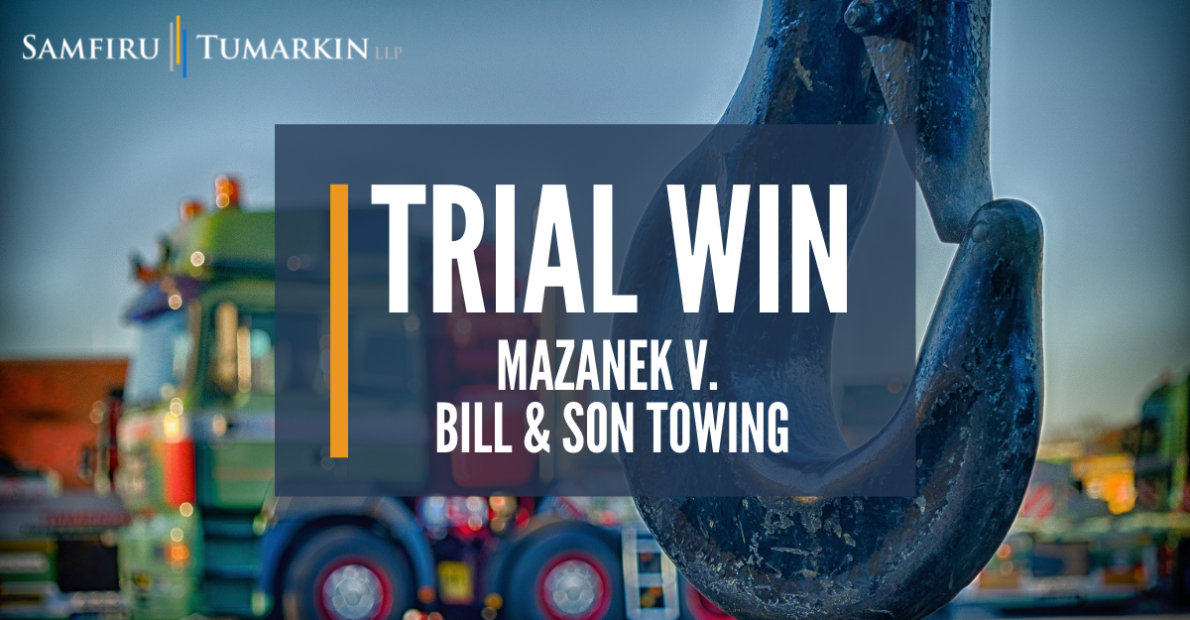Trial Win: Severance for tow truck driver misclassified, wrongly fired for theft

Mazanek v. Bill & Son Towing
Partner David Vaughan and associate Lluc Cerda successfully obtained six months of severance pay for their client, Mr. Mazanek, after a three-day trial in Ontario Superior Court. Mr. Mazanek was a 44-year-old tow truck driver who was misclassified as a contractor by his employer. He was terminated for cause due to serious allegations of theft.
At trial, the court found that the employer had not been able to prove any of its theft allegations and that the employer’s main witness was not credible.
Overview of the Case
Mr. Mazanek had worked at Pearson airport as a tow-truck driver for the defendant Bill & Son Towing for five-and-a-half years. In October 2017, he was terminated over the phone and provided with no reason for his termination.
After the start of litigation, the company alleged that Mr. Mazanek had been stealing gasoline for personal use by using the company gas card, and it counter-sued Mr. Mazanek for $100,000. It also alleged he did private towing with the company truck for cash and that he stole items from cars he had towed. The employer had been suspicious about the gas theft for several months due to what it believed was high gas expenses at its Pearson airport tow-truck operation. Mr. Mazanek was one of four drivers employed there and they all used the same gas card. At no time prior to termination did the employer confront Mr. Mazanek with its suspicions and provide him with an opportunity to respond. This oversight would prove fatal at trial.
The Court’s Findings
The employer called three witnesses, including another tow truck driver who said he had seen Mr. Mazanek steal gas. However, the court found that this driver was not credible and disregarded the entirety of his evidence. Another witness, the employer’s accountant, had prepared a document showing all the gas purchases made over a period of 18 months and the drivers who had made each purchase. It was revealed at trial that this document was so inaccurate that it, too, was found not to be credible and was disregarded. As such, the employer failed to prove its theft allegations. The remaining allegations were also either not proved or were too trivial to warrant “for cause” termination.
Finally, the court held that Mr. Mazanek was an employee and not a contractor because he used the employer’s truck, wore its uniform, and was constantly monitored by a GPS device in the truck.
The court awarded Mr. Mazanek 6 months of severance and vacation pay for the 2 years prior to the start of his lawsuit. It dismissed the counter-claim brought by the defendant.
Takeaways for Employees
Dismissal for cause difficult to prove
Employers will sometimes claim they have cause for termination to avoid paying employees their severance. A termination for cause is exceedingly difficult to establish. Mere suspicions will not be enough if those suspicions cannot be proven.
Misclassification of employees is not tolerated
This case is another example of employers misclassifying employees as contractors to avoid employment standard laws. Courts will not tolerate this if the underlying relationship is really one of employer-employee and will retroactively award employees their employment rights.
LEARN MORE
Severance pay for truck drivers
Individuals who are identified or treated as independent contractors should always contact an employment lawyer immediately upon termination to find out the true definition of their working relationship, and what compensation they are entitled to.
Takeaways for Employers
Employees need an opportunity to respond to allegations
The court emphasized that it is important to give employees an opportunity to respond to serious allegations of theft, fraud, or harassment. This allows employers to ensure that they have all the facts prior to deciding whether discipline is warranted. The employer in this case waited to trial to find out that there were serious problems with the other driver’s credibility and with its own “investigation”. While the court emphasized that small employers need not undertake a lengthy and expensive investigation in all cases, they are still required to at least give the employee an opportunity to respond.




